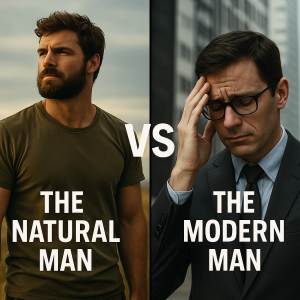Most men live their lives straining after rewards that are not really theirs to control. Recognition, reproduction, status, applause—these are the external carrots dangled in front of the modern man. He learns to chase approval from others, to measure his worth by whether someone noticed, whether a crowd clapped, or whether his name carried beyond his own circle. The problem with that path is simple: it never ends. No amount of recognition satisfies the hunger of a man who believes that recognition is the only proof of his existence.
The Natural Man takes another path entirely. His foundation is internal, not external. He does not wait for society to tell him who he is or whether his work matters. He embodies his archetypes, pushes forward into his own challenges, and carries his duties whether or not anyone thanks him for it. His rewards are richer, more enduring, and far less fragile.
The Internal Rewards: Standing Solid in Himself
The first and greatest reward of being a Natural Man is the satisfaction of knowing he is living true to his own calling. This is emotional, even spiritual. There is a deep sense of calm that comes when a man acts in line with who he was built to be.
Psychologists sometimes call this “congruence”—when a person’s actions match his values. Research on well-being shows that people who live congruently, who act in line with their inner compass, report higher levels of life satisfaction and resilience, even under stress. For the Natural Man, this means he is never divided against himself. He does not need to put on a mask in public and then live another way in private. His strength is quiet, but it is constant.
There is also the psychological reward of competence. Every time a Natural Man meets a challenge—whether physical, intellectual, or creative—he proves to himself that he is capable. He may not always win, but he always learns. That growth is its own form of joy. Unlike recognition, which depends on someone else clapping, competence is self-verified. You know when you have become better. You feel it.
Finally, there is the emotional satisfaction of endurance. To keep going when life pushes back, to refuse to collapse under pressure—this brings a quiet pride that no one can take away. Men who endure without complaint discover an old truth: suffering in silence can forge character stronger than comfort ever will.
The External Rewards: Appreciation and Legacy
Beyond these inner satisfactions, there are two external rewards that often find their way to the Natural Man: appreciation and legacy. But these are not requirements. They are not demanded, and they are never begged for.
Appreciation is about value, not recognition or gratitude. Recognition can be shallow, noisy, and fleeting. It is applause on a stage, a digital thumbs-up, a name in a headline. Appreciation, by contrast, is quiet acknowledgement. It is when you or someone else acknowledges the value of what you do. Sometimes it comes from family, sometimes from a stranger, sometimes from a colleague who knows how heavy the load was. But here is the key: the Natural Man does not require it. He can appreciate his own work. He can look at what he built, what he gave, what he carried, and nod in approval—whether anyone else does or not.
Legacy is not the same as reproduction. Procreation is biological continuation. Legacy is the mark you leave on the world. Soldiers who defeated tyranny left a legacy of freedom. Inventors who created new tools left a legacy of progress. Even a quiet man who teaches his neighbor’s children how to fish leaves a legacy of skill passed down. Legacy is what outlives you, but it does not require children, followers, or monuments. It can be as small as a carved stone that someone else finds useful, or as vast as a movement that changes a culture.
What makes the Natural Man unique is that he can pursue these rewards alone if necessary. He does not need a crowd to appreciate him, and he does not need a tribe to preserve his legacy. He can build, he can plant, he can write, he can create—knowing full well that his effort has value, even if no one else notices until long after he is gone.
Standing Alone, Standing Together
This is why the Natural Man’s journey differs from almost every other self-help concept pitched at men today. So many of those frameworks rely on outside recognition as their ultimate proof: get the girl, get the followers, get the job, get the title. The Natural Man does not. He is already complete in himself.
And yet, though he can stand alone, he is never truly alone. When Natural Men gather—whether in friendship, in fellowship, or in pursuit of a common challenge—something greater happens. They do not need to constantly reassure each other, because each one is already standing solid in himself. Their strength multiplies without draining one another. It is like a line of shields in formation: each is strong individually, but together they are unbreakable.
This is the paradox of the Natural Man. He does not need anyone else to validate him, but he becomes even more powerful when among others who are like him. Not because they prop him up, but because they stand shoulder to shoulder, each carrying his own weight, each appreciating the other without words. Nothing feels quite so satisfying as someone you respect saying you did a good job.
The Freedom of a Different Reward System
To live this way is to be free from the endless cycle of external validation. Recognition fades. Reproduction does not guarantee meaning. But appreciation and legacy—whether received from others or given to yourself—last longer. They are markers of a life well lived, not just a role well played.
And when a man finally rests at the end of his days, he will not ask, “Did the crowd notice me?” He will ask, “Did I live as I was meant to live?” For the Natural Man, the answer can be yes even in solitude. His heart is full, his path is steady, and his legacy is already in motion, whether anyone else sees it now or not. It does not matter how old you are when you start… only that you start.





